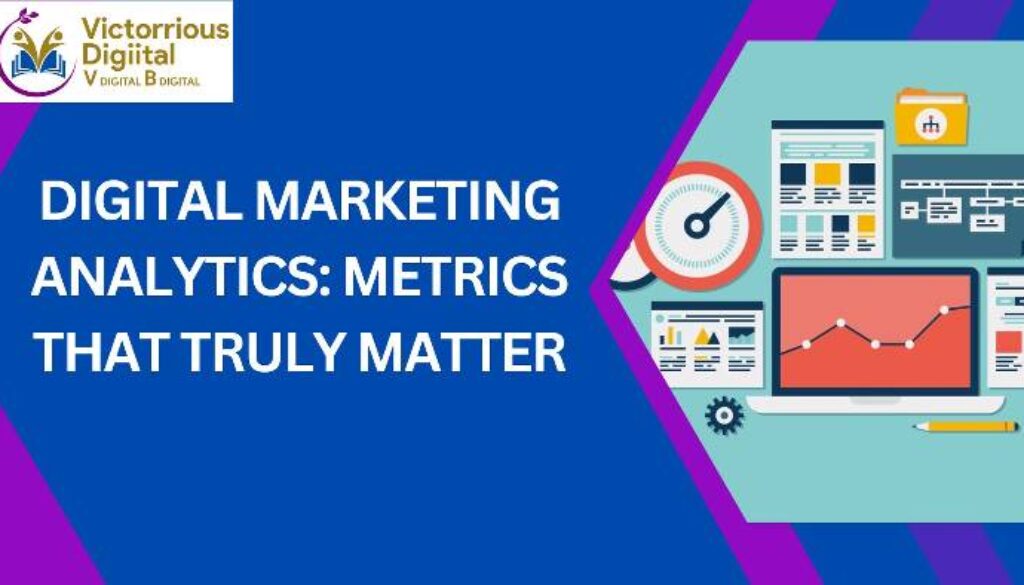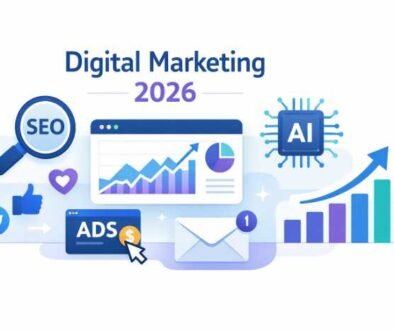Digital Marketing Analytics: Metrics That Truly Matter
In the rapidly evolving realm of digital marketing, success hinges on adeptly navigating the intricate network of metrics that define online performance. This comprehensive exploration delves deep into metrics that transcend superficial indicators, underscoring the critical importance of assimilating insights gained from state-of-the-art digital marketing courses to elevate and refine strategic approaches.
Unveiling the Power of Digital Marketing Courses
Embarking on the journey to master digital marketing analytics necessitates a robust foundation, meticulously laid through engagement with reputable digital marketing training institute. These courses serve as the cornerstone of your knowledge base, seamlessly blending theoretical concepts with practical applications. Beyond imparting information, a well-rounded education equips you with the latest industry trends and offers hands-on experience, empowering you to apply analytics principles effectively in real-world scenarios.
The Core Metrics: A Deep Dive
1. Conversion Rate Optimization (CRO): Fine-Tuning Success At the core of any digital marketing strategy lies the fundamental goal of converting website visitors into customers. Conversion Rate Optimization (CRO) emerges as the linchpin in this process, measuring the percentage of website visitors who take a desired action. A nuanced understanding of CRO allows for fine-tuning your website’s design and content, ensuring a seamless user journey that maximizes conversions.
2. Return on Investment (ROI): Beyond Vanity Metrics Venturing beyond mere vanity metrics, ROI stands as the ultimate litmus test for the efficacy of your digital marketing endeavors. It quantifies the profitability of your campaigns by rigorously comparing the revenue generated against the costs incurred. Armed with this insight, strategic optimization of budget allocation becomes possible, channeling resources into strategies that promise the most substantial returns.
3. Traffic Quality: More Than Numbers While attracting a high volume of traffic is a common objective, the quality of that traffic is equally—if not more—crucial. Metrics such as bounce rate, session duration, and pages viewed per visit provide a nuanced understanding of how engaged your audience is. Quality traffic ensures that visitors find genuine value in your content, reducing bounce rates and increasing the likelihood of meaningful conversions.
4. Social Media Engagement: Building Connections In an era dominated by social media, metrics related to engagement take center stage. Likes, shares, and comments on your social media platforms serve as vital indicators of your brand’s resonance with your audience. Effective social media engagement builds a community of advocates who amplify your reach and contribute significantly to organic growth.
5. Customer Lifetime Value (CLV): Beyond the Initial Transaction Understanding the enduring value of a customer is paramount in digital marketing. CLV transcends the confines of the initial transaction, encompassing the total revenue a customer is anticipated to generate throughout their ongoing relationship with your brand. Focusing on strategies that enhance CLV ensures sustained profitability and fosters enduring customer loyalty.
6. Email Marketing Metrics: Nurturing Relationships Email marketing remains a stalwart in the digital marketing arsenal. Beyond open and click-through rates, metrics such as conversion rate, subscriber growth rate, and email sharing/forwarding rate offer a holistic view of your email campaigns. Effective leveraging of these metrics allows for the nurturing of customer relationships, personalization of content, and tailoring of approaches based on audience behaviors and preferences.
7. Search Engine Rankings: Visibility is Key In the digital landscape, visibility is synonymous with success. Search engine rankings play a pivotal role in determining your online visibility. Monitoring metrics such as organic search traffic, keyword rankings, and click-through rates provides invaluable insights into the effectiveness of your SEO strategies.
Translating Insights into Action
Gaining insights from these key metrics marks only the inception; the true power lies in translating these insights into actionable strategies.
Crafting a Data-Driven Content Strategy
Armed with an in-depth understanding of your audience’s preferences and behaviors, you can meticulously craft a data-driven content strategy. Identifying topics that resonate with your audience, creating compelling content, and optimizing for relevant keywords bolsters your SEO and establishes your brand as an authoritative voice within your industry.
Personalizing the Customer Journey
Metrics such as customer lifetime value and email marketing engagement provide valuable data for personalizing the customer journey. Leveraging this information allows for the tailoring of communications, recommending personalized products or services, and enhancing the overall customer experience. A personalized approach fosters brand loyalty and significantly increases the likelihood of repeat business.
Iterative Campaign Optimization
Digital marketing is inherently dynamic, and sustainable success demands agility. Implementing iterative optimization based on metrics such as conversion rate and ROI ensures that your campaigns evolve in sync with changing market dynamics. A/B testing, analyzing the performance of different creatives, and adjusting strategies in real-time keep your marketing efforts agile and highly effective.
The Ever-Evolving Landscape: Continuous Learning
In the digital marketing realm, stagnation is the adversary of success. Continuous learning is not merely encouraged; it is imperative. The algorithms governing search engines, social media platforms, and consumer behavior are in a perpetual state of flux. Staying ahead necessitates staying informed. Regularly updating your skills through ongoing participation in digital marketing classes is the linchpin to remaining at the forefront of industry trends and maintaining a competitive edge.
In Conclusion: Mastering the Art and Science
Mastering digital marketing analytics is both an art and a science. It involves understanding the nuances of human behavior and interpreting data, adeptly leveraging technology to create impactful campaigns. By seamlessly integrating insights from top-tier digital marketing courses, you position yourself ahead of the competition and contribute significantly to the advancement of the digital marketing landscape as a whole.




